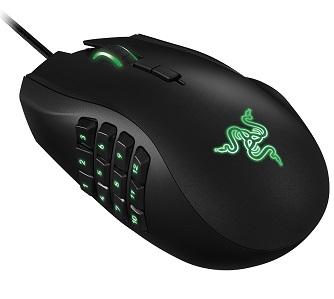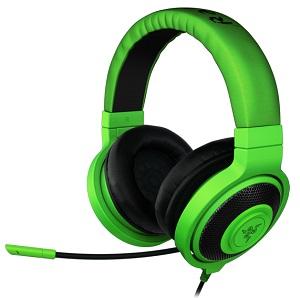Audio, mobile and diversification
HEXUS: The gaming peripherals market is constantly growing in size with new brands who think their products have something unique to add to the mix. What do you feel gives Razer a competitive edge over rival brands, what sets Razer apart from the competition?
MLT : I think the problem is they don’t think they have a competitive edge; they are looking for a competitive edge to be able to sell products. There’s a huge fundamental difference when it comes down to designing a product. If you’re a corporation and you’ve got targets to hit then it’s purely a marketing perspective - they only look at unique selling points (USPs) that will differentiate themselves.
What’s truly different about Razer is that we’ve always been able to stay ahead of the curve from just pure technology because we have exclusives on technology and are ahead of others. From a design perspective we’ve got some of the best designers on the planet and essentially we understand gamers more than anyone else because the entire company is made up of gamers.
Let me give you an anecdotal example. The Naga is the defacto MMO mouse today, and we launched it back in 2008/2009, and I like to tell this story because I saw another company recently launched a Naga knock-off, which is fine. I think it’s fine that they have knock-offs. But I saw the design video that they came up with and I laughed because they said, ”you know this keypad on the side?,” we designed it because we polled so many MMO gamers out there and they said this was the best design. When I watched that I laughed because we came up with it first and I knew why we came up with it.
The whole progeny of the idea was that in 2008/2009 we knew that MMO gamers needed a lot of buttons to be able to achieve what they did. Different people tried different things, they tried to put buttons all around the mouse and most didn’t work. The eureka moment came for me when I was driving and messaging with my feature phone back then. There were no smartphones, the iPhone hadn’t been launched yet (are you sure, Min? - ed), and all of us were texting each other through a keypad.
The eureka moment was “how do we put so many buttons on a mouse?” and I said “everyone’s been trained to do that because I can now text my friends with one hand while driving because I’ve got the muscle memory to do that.” So I thought, great, let’s put the keypad on the side of the mouse and that design was only possible back in 2008/2009 because anthropologically and culturally that’s the only design that made sense at that point in time.
If I were to design an MMO mouse today without the benefit of all of that I would never, ever put a keypad at the side of the mouse because it wouldn’t make any sense. So there I was watching that video thinking “you have absolutely no clue,” that is not design, that is ripping off. I think it’s good to have companies trying to do this, because it’s good for the overall industry, but I think it also shows the difference between us and the rest of the world.
We create standards, we push ahead and we create benchmarks that unfortunately, more often than not, get copied. The Blade laptop is a great example. When we came up with it everybody said we were nuts; today it’s a whole new category for laptops, thin-and-powerful laptops. I remember I had to go through all laptop manufacturers at that point in time to the extent I had to tell one of them, "I’ll write you a cheque – please build this for me." They said no, nobody wants your product, and today they are the number-one people who are ripping-off our product. That’s the funniest thing, but our difference is we understand gamers.
HEXUS: Gaming headsets have developed a dubious reputation among some PC gamers. Does Razer have any plans to tackle this gaming audio market in a different way?
MLT : This is the gaming-sound signature, and we are really focused on creating products that are for gamers – we don’t pretend to do anything else. Could we do something else? Yes, we can and we actually have individually-tuned headphones for ourselves for listening to vocals, and stuff like that, but I think because we are just so hyper-focused on gamers, that’s going to be the sound signature. We’ve defined a sound signature for pretty much everything out there, we emphasise the lower frequencies and stuff like that.
We’re not apologetic for the fact that we focus on gamers, but if an audiophile were to ask me what my favourite headphones are, I like the Grados for example. I like the open sound, although I don’t like the way it presses on my ear after a while and anybody who has Grados will tell you that.
I like the Sennheisers, I think they are truly great. I don’t think we should be ashamed of recommending other brands, I like the HD 650s, HD 800s when I’m listening to music, etc., but for gaming headphones we are the leaders. That’s the sound signature I like to use when gaming, I don’t like to use my Grados when I’m playing games. We don’t want to be all things to all people. I highly recommend some of these headphones, some of them are open-backed ones which are great as they give you a broader soundstage but we don’t want to be all things to all people - that’s my view of it.
HEXUS: As the popularity of mobile gaming increases how does Razer plan to stay at the forefront of an increasingly mobile market? Will we see a push towards gaming tablets, handhelds or smartphones?
MLT : I think at Razer our vision has always been very clear, we just want to focus on the gamer and we want to go everywhere the gamer goes. We don’t release a lot of products, in fact we tend to be very laser-focused on the products that we release... it’s just that every time we release a product people go “shut up and take my money.” That’s what we do, we’re just so hyper-focused to be around the gamer that anything we think can touch on or improve the gamer’s life or game is something we’re going after.
The mobile market is definitely something we are interested in - the most-requested product is a smartphone from Razer but we don’t discuss what may or may not be a future product…apart from toasters!
HEXUS: With so many PC brands diversifying their product portfolios to include more products, does Razer feel under pressure to expand into new markets beyond its current main focus on gaming peripherals?
MLT : I think we’re happy, one of the constant things that are talked about is how Razer could be five times larger overnight if we decided to go into mass-market products and stuff like that. One of the constant refrains from people is “oh, Min, if you could make your products cheaper, why don’t you just cut away a few features or dumb it down and it could bring the price down and you could sell so much more.” Yes, we know we could but we don’t want to, that’s the thing, we just want to focus on products we want ourselves, and if I knew that by dumbing-down products we could sell more it would become a product we wouldn’t want to use ourselves – what’s the point?
I think we’re happy being hyper-focused, because we’re seeing a lot of other companies achieving mass-market success and we wish them the best. We don’t make poor products just to make money, I think that’s the thing, we want to make the very best products and that’s us. We don’t apologise for it, that’s just what we think we are good at and we will always do that.




